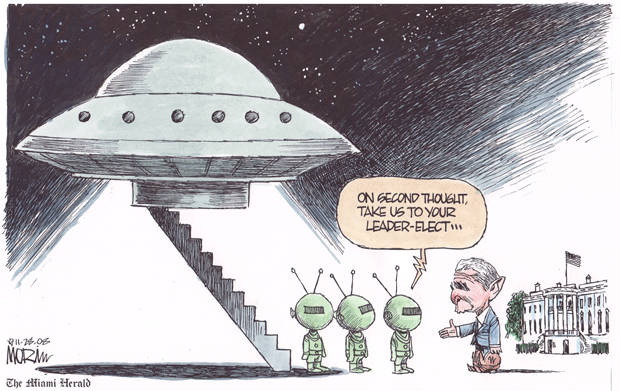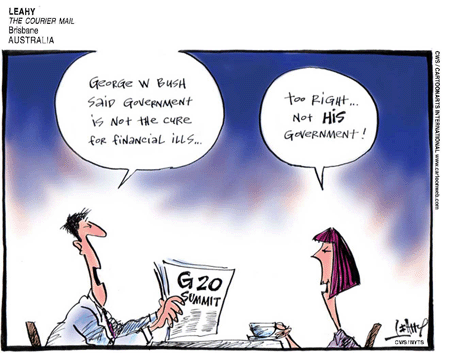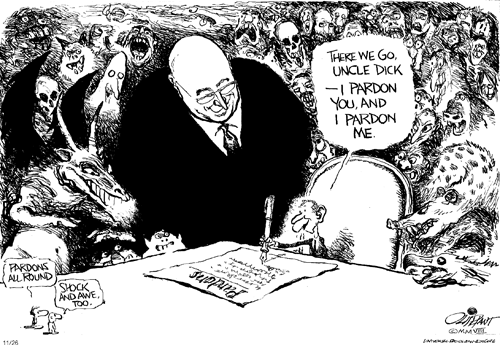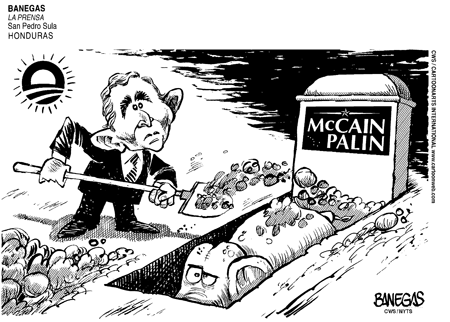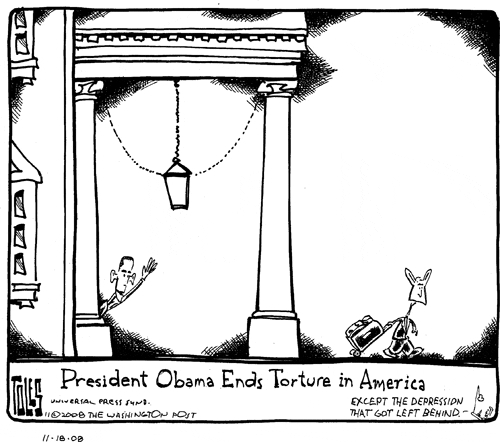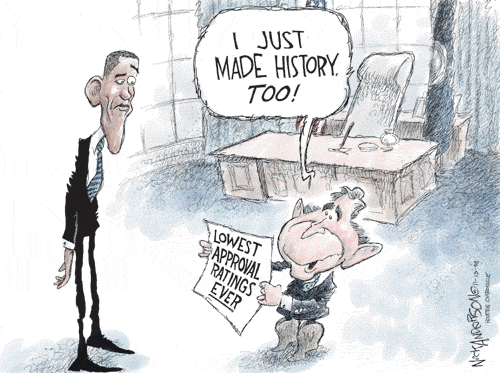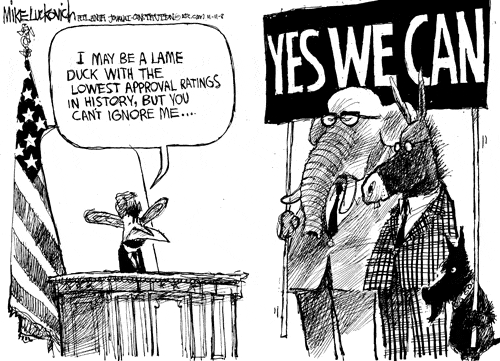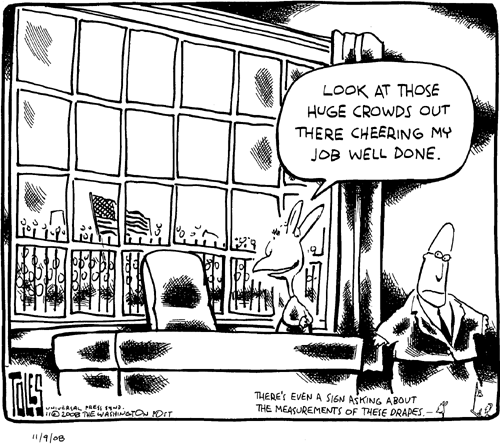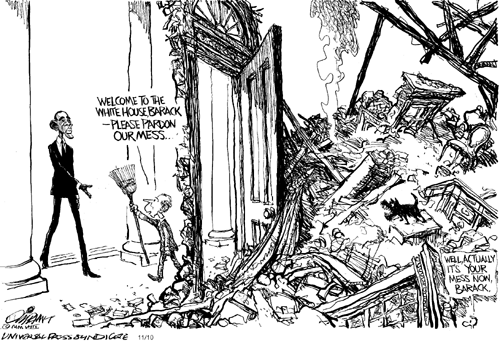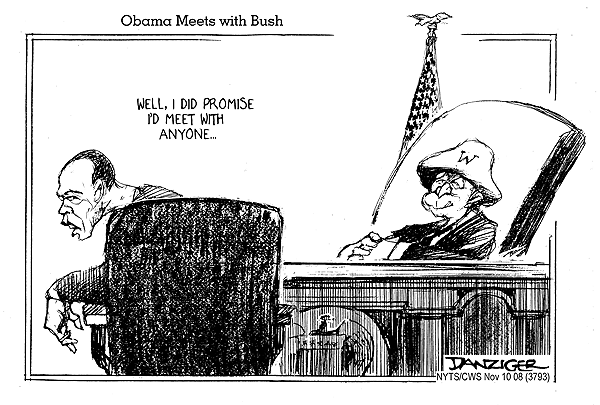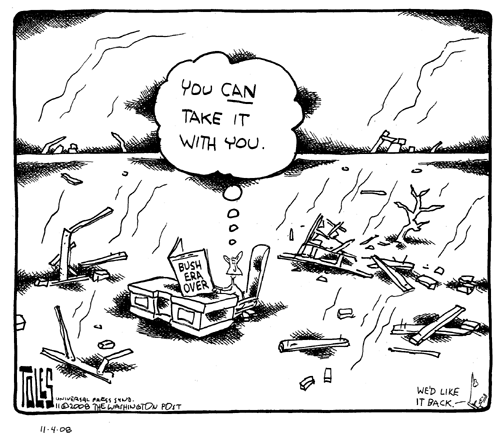Bush Still Draws a Blank
By Dan Froomkin
Special to washingtonpost.com
Wednesday, November 12, 2008; 1:16 PM
Nearing the bitter end of eight ruinous years in office, President Bush still won't acknowledge a single substantive thing he did wrong. Asked if he had any regrets in a CNN interview yesterday, Bush copped to a few public-relations gaffes many years ago. His tone, however, was anything but apologetic. In fact, he seemed quite pleased with himself.
It's all very reminiscent of that April 2004 press conference, when Bush was famously flummoxed when asked to describe his biggest post-9/11 mistake -- and what lessons he had learned from it. Bush's response at the time solidified his reputation as someone who engaged in little or no self-reflection. Four and a half momentous years later, does he think nothing went wrong? Or does he simply think it wasn't his fault?
Here's the transcript of his interview yesterday with CNN's Heidi Collins. The video shows Bush sounding like a schoolchild forced to apologize for something he doesn't feel the least bit sorry about. Note his exaggerated pronunciation of the two words I've put in italics.
Collins: "I imagine you probably have a moment in your presidency that you are most proud of, and a moment I'm sure you most regret."
Bush: "I regret saying some things I shouldn't have said."
Collins: "Like?"
Bush: "Like 'dead or alive,' or 'bring 'em on.' And, by the way, my wife reminded me as president of the United States, you better be careful what you say. I was trying to convey a message. I could have conveyed it more artfully.
"Being on this ship reminds me of when I went to the USS Abraham Lincoln and they had a sign that said 'Mission Accomplished.' I regret that sign was there. It was a sign aimed at the sailors on the ship, but it conveyed a broader knowledge. To some it said, well, Bush thinks the war in Iraq is over, when I didn't think that. But nonetheless, it conveyed the wrong message. So, there are things I've regretted."
As it happens, all three of these incidents were indicative of serious failings way beyond an unfortunate turn of phrase or misplaced banner. His "dead or alive" comment was not an accident, it was a perfect expression of the cowboy thinking that got us into the Iraq war in the first place. "Bring 'em on" remains shocking not because it was inartful, but because it exemplified an insufficiently serious concern about putting other people's lives at risk. And "Mission Accomplished" took on such incredible resonance at least in part because it called attention to Bush's failure to plan for what turned out to be the real war.
For the record, Bush has expressed regrets about his cowboy rhetoric before, starting back in January 2005, again in May 2006, and most recently in aJune interview with the Times of London. Phrases such as "bring them on" or "dead or alive", he told the Times, "indicated to people that I was, you know, not a man of peace."
Bush hadn't previously voiced any regrets about the "Mission Accomplished" banner, but Karl Rove did, as early as April 2004.
And as I've noted in the past, Bush has never really apologized for the abuse of Iraqi prisoners, or even expressed regret about not taking more decisive action to prevent the genocide in Darfur.
He just doesn't do second thoughts, does he?
Join My Group
Here are some questions the next reporter who gets a sit-down with the president might well ask:
* Would he, in retrospect, have prepared differently for the occupation of Iraq?
* Does he wish he had issued clearer directives against torture in Iraqi prisons?
* Would he, in hindsight, have been more skeptical of the WMD intelligence?
* Does he regret not having heeded that pre-9/11 briefing on the threat posed by Osama bin Laden?
* Does he regret not having done more to prevent the destruction of New Orleans?
But what else might Bush reasonably regret? Or, alternately, why is he right not to regret anything beyond a few communication flubs? I'd like to hear your thoughts.
Today I'm launching a new discussion group. It's called White House Watchers, and it has two goals. One is for it to be a welcoming and civil place where my readers can discuss specific White House-related issues. And the other is to get you to help me collect information and views I can then use in the column. Today's topic is Bush's regrets: Too many or too few? Share your thoughts here.
Anyone can read what's been posted, but if you want to jump into the conversation, you'll need to "join" my group. Click the button at the top of the group page that says "Join Group" or "Register to Join Groups". (You'll need to be registered and logged into the site.)
Unlike the comment threads that are associated with each of my columns, there will be a specific topic for each group discussion, and I'll ask that people try to stick with it. I'll also ask that people respect opposing points of view. And finally, I'll ask that people not indulge in flame wars. I will kick you off if you are abusive to other group members.
More About That Interview
So what's next for the president?
"I'm not sure what to tell you because I know I'm going to go from 100 mph to near zero overnight," Bush told Collins. "I'm not sure what to expect. I know I'll miss certain things about the presidency. I also know I'm looking forward to getting home, so I've got mixed emotions."
Bush seems to think things will settle down once he's gone.
Collins: "Where do you see this country in four years?"
Bush: ""You know, it's hard to tell. I am pretty confident that we will recover from the economic times. That Iraq will be a symbol of freedom, that Afghanistan will improve. There's a -- the country will be secure. It's gonna be very important for the president and the Congress to work together to make the decisions so that we can succeed in keeping us secure and helping us regain our prosperity."
And he continues to scoff at the polls -- which now show him to be the most unpopular president in the history of polling.
Collins: "Do you ever get disappointed? Does it make you feel a certain way?"
Bush: "I think a president who tries to be popular is a president who could fail the country. And I remind people popularity is fleeting. Principles are forever. And there've been times when I've been popular and times when I haven't been popular. But the job of the president is to make good, tough decisions based upon solid principles that are etched in his soul. I know there's this kind of preoccupation by some by popularity polls, but for me they're just moments, they come and go. But what doesn't change [is] what you believe and can you defend those beliefs."
As for the election, Bush acknowledged that his man didn't win, but had warm words for the president-elect: "I meant what I said after the election, that the election of Barack Obama is an historic moment for our country. There are a lot of people in America who did not believe they would ever see this day. It is good for our country that people have hope in the system and feel vested in the future and President-elect Obama has a great opportunity. I really do wish him all the best."
Monday's Visit
Two initial reports out of Monday's historic Oval Office meeting between Bush and Obama had the current president offering his successor what seemed like a quid pro quo.
Jackie Calmes wrote in the New York Times: "The struggling auto industry was thrust into the middle of a political standoff between the White House and Democrats on Monday as President-elect Barack Obama urged President Bush in a meeting at the White House to support immediate emergency aid.
"Mr. Bush indicated at the meeting that he might support some aid and a broader economic stimulus package if Mr. Obama and Congressional Democrats dropped their opposition to a free-trade agreement with Colombia, a measure for which Mr. Bush has long fought, people familiar with the discussion said."
Lori Montgomery and Michael D. Shear wrote in The Washington Post: "Bush, speaking privately to Obama during their first Oval Office meeting, repeated his administration's stand that he might support quick action on those bills if Democratic leaders drop their opposition to a Colombia trade agreement that Bush supports, according to people familiar with the discussions."
But the White House pushed back. And Caren Bohan writes for Reuters: "Aides to President-elect Barack Obama distanced themselves on Tuesday from reports that President George W. Bush had pressed Obama to back a free trade deal with Colombia in exchange for help for the struggling automobile industry.
"Obama advisers also played down suggestions the incident had led to tensions with Bush and his staff as the two sides seek to ensure a smooth presidential transition.
"'I would characterize our relationship as collegial,' said John Podesta, co-chair of Obama's White House transition. 'Whatever happened this morning was the result of reports which I think were not accurate.' . . .
"'The president didn't try to link Colombia to the question of an economic recovery package going forward. They talked about both of them,' he said in a briefing with reporters and added he had spoken earlier in the day with White House chief of staff Josh Bolten about the media reports."
Candy Crowley reports for CNN: "Those stories that Bush was bargaining irritated some White House aides, who thought the leaks were designed to make Obama look good, at Bush's expense. All that happy transition talk seemed in jeopardy, but the Obama team moved quickly. One source said there was no wheeling and dealing. 'President Bush did not specifically suggest a quid pro quo.'
"And Obama transition co-chair John Podesta called White House Chief of Staff Josh Bolten to smooth things over. By the time President Bush got to the USS Intrepid, the warm fuzzies were back."
Bush wouldn't discuss his conversation with Obama in the CNN interview: "To the extent he asked my advice, you know I -- and he may want to ask it again. And the best way to make sure he feels comfortable asking it again is for me not to tell you in the first place what I advised him," Bush said.
"So we had a very private conversation. It was relaxed. It was interesting to watch a person who is getting ready to assume the office of the president. This will be a fantastic experience for he and his family.
"I don't -- I mean he didn't need my advice about supporting the military. He knows he must do that. And we had a good conversation. I was very pleased.
"And I remember the conversation I had with my predecessor, Bill Clinton. As a matter of fact, I called him yesterday and, you know, I said, Bill, I'm getting ready to meet with the new president and I remember how gracious you were to me and I hope I can be as gracious to President-Elect Obama as you were to me."
Transition Watch
Indeed, as Ben Feller writes for the Associated Press: "No matter how people remember President Bush's time in office, let there be no doubt about how he wants to end it: gracefully. . . .
"With just 70 days left as president, Bush is pretty much out of time to alter public perception of his performance. He cannot get a Middle East peace deal, or turn around a failing economy, or rekindle broad support for the war in Iraq. But leaving on good terms? Now that he can control.
"So on Monday at the White House, Bush warmly welcomed Obama, whose dominant win last week was largely seen as a referendum on the Bush years. . . .
"Ending a tumultuous second term on a positive note certainly can't hurt his standing as he returns to private life."
But Stephen Hess, a senior fellow emeritus at The Brookings Institution and the author of a new book about presidential transitions, tells Feller that won't be enough to change his legacy.
"The encyclopedia is still going to read: 'George W. Bush, 43rd president of the United States, who created a war in Iraq' or 'who let the country be flooded by Katrina,'" Hess said. "It's not going to be, 'George W. Bush, who left the office gracefully.'"
Undoing Watch
Walter Pincus and Karen DeYoung write in The Washington Post: "The nation's top two intelligence officers expect to be replaced by President-elect Barack Obama early in his administration, according to senior intelligence officials.
"A number of influential congressional Democrats oppose keeping Director of National Intelligence Mike McConnell and CIA Director Michael V. Hayden in their posts because both have publicly supported controversial Bush administration policies on interrogation and telephone surveillance. One Democrat on the Senate intelligence committee said there is a 'consensus' view on the matter.
"Both wish to remain on the job, officials say, though neither has said so publicly, and both think that their early departures could be seen as politicizing their offices and setting a precedent for automatic turnover when the White House changes hands."
Of course, there's another way of looking at it: Accountability.
And talk about politicizing their offices! As Pincus and DeYoung note: "Hayden, a former head of the National Security Agency, was in charge of the nation's electronic eavesdropping when the White House ordered warrantless surveillance of some U.S.-based communications. McConnell angered some congressional Democrats during a bruising fight over legislation to expand U.S. wiretapping authority."
See my August 8, 2007, column, Chief Spy or Chief Enforcer?
Meanwhile, Siobhan Gorman writes in the Wall Street Journal: "President-elect Barack Obama is unlikely to radically overhaul controversial Bush administration intelligence policies, advisers say, an approach that is almost certain to create tension within the Democratic Party.
"Civil-liberties groups were among those outraged that the White House sanctioned the use of harsh intelligence techniques -- which some consider torture -- by the Central Intelligence Agency, and expanded domestic spy powers. These groups are demanding quick action to reverse these policies.
"Mr. Obama is being advised largely by a group of intelligence professionals, including some who have supported Republicans, and centrist former officials in the Clinton administration. They say he is likely to fill key intelligence posts with pragmatists."
What About All the Secrets?
Jack Balkin writes in a Guardian opinion piece: "Obama will have to decide whether to rescind a series of secret opinions and orders authorising the Bush administration's detention, surveillance and interrogation practices. Secret laws were a hallmark of the Bush years. For all the criticism of Bush administration policies leaked to the public, there may be many others even more morally and legally troublesome. Obama will face difficult decisions about which decisions to rescind and which to retain.
"Giving up power is harder than it sounds. Obama's attorney general will have to craft new limits and new methods of accountability. This, in turn, may invite intense scrutiny of what happened in the immediate past. Both Congress and the public may demand to know about secret orders and opinions authorising torture, domestic spying or other forms of illegal activity. Obama and his advisers will have to decide whether political prudence and national security require them to conceal the previous administration's dirty little secrets.
"Indeed, the more we find out about the excesses of the Bush years, the louder will be the demands for investigating and prosecuting Bush administration officials for violating national and international law. Whether or not such prosecutions are deserved, they threaten to derail the next president's positive agenda. Political opponents will scream that the new administration is criminalising ordinary politics and punishing patriots. Bipartisanship will quickly become difficult if not impossible. This may tempt Obama to sweep past wrongdoing under the rug, hoping that he can reform the executive branch entirely in secret. But secret reforms raise many of the same problems of accountability as the secret laws they replace."
Gitmo Watch
Peter Finn writes in The Washington Post: "The Obama administration will launch a review of the classified files of the approximately 250 detainees at Guantanamo Bay immediately after taking office, as part of an intensive effort to close the U.S. prison in Cuba, according to people who advised the campaign on detainee issues.
"Announcing the closure of the controversial detention facility would be among the most potent signals the incoming administration could send of its sharp break with the Bush era, according to the advisers, who spoke on the condition of anonymity because they are not authorized to speak for the president-elect. They believe the move would create a global wave of diplomatic and popular goodwill that could accelerate the transfer of some detainees to other countries. . . .
"Human rights advocates and some advisers expect the new administration to outlaw torture and enhanced interrogation techniques, detain people seized on the battlefield in Iraq and Afghanistan under the traditional laws of war, and insist on criminal prosecution against terrorism suspects seized elsewhere."
Torture Watch
Is it possible there will be some rollback even before Obama takes office?
Julian E. Barnes writes in the Los Angeles Times: "As the clock runs down on the Bush administration, moderates within the government are mounting what may be one last drive to roll back many of the harsh detention and interrogation policies pushed through by Vice President Dick Cheney.
"The effort, led by officials at the State Department, represents the latest battle in a war between hard-liners and moderates that has raged though most of the Bush administration.
"In the early years of George W. Bush's presidency, Cheney and his allies won most of the internal contests over the Guantanamo Bay prison, the CIA's interrogation program, domestic spying, military commissions and other contentious issues.
"But internal critics -- including the State Department's legal advisor, John B. Bellinger III -- fought against those efforts. Buoyed by congressional action and court rulings, the moderates in recent years have helped break down administration resistance to international agreements and standards. The latest push underscores how deeply unpopular the most hawkish White House stances have proved to be even within the administration itself."
Afghanistan Watch
Karen DeYoung writes in The Washington Post: "The incoming Obama administration plans to explore a more regional strategy to the war in Afghanistan -- including possible talks with Iran -- and looks favorably on the nascent dialogue between the Afghan government and 'reconcilable' elements of the Taliban, according to Obama national security advisers.
"President-elect Barack Obama also intends to renew the U.S. commitment to the hunt for Osama bin Laden, a priority the president-elect believes President Bush has played down after years of failing to apprehend the al-Qaeda leader. Critical of Bush during the campaign for what he said was the president's extreme focus on Iraq at the expense of Afghanistan, Obama also intends to move ahead with a planned deployment of thousands of additional U.S. troops there."
Plum Book Watch
Ed O'Keefe blogs for washingtonpost.com: "Today marks the release of the Plum Book, a compilation of all of the political jobs in the Bush Administration, including who currently holds the position and salary information."
But it's not quite all the political jobs. As he did four years ago, Vice President Cheney refused to list the people in his office -- even those who are paid out of the vice president's executive appropriation. His office instead states: "The Vice Presidency is a unique office that is neither a part of the executive branch nor a part of the legislative branch, but is attached by the Constitution to the latter. The Vice Presidency performs functions in both the legislative branch (see article I, section 3 of the Constitution) and in the executive branch (see article II, and amendments XII and XXV, of the Constitution, and section 106 of title 3 of the United States Code)."
Book Watch
Hillel Italie writes for the Associated Press: "Laura Bush wants to write a memoir and will be meeting with several publishers, according to three publishing executives with knowledge of the proceedings. . . .
"While publishers have urged President Bush to hold off on shopping a proposal, citing his poor approval ratings, they have expressed great enthusiasm about his wife."
The New York Post's Page Six reported yesterday: "Literary superagent Mort Janklow told us: 'The wives of presidents generally write books that have a greater public interest. Wives usually write from a personal point of view - instead of talking about government policy, they talk about when the dog came to the White House and had to be paper-trained. Husbands usually try to rewrite history.'
"Asked how long George should wait before shopping his memoir, Janklow quipped, '30 or 40 years might be good.'"
Bush's Day
Devlin Barrett writes for the Associated Press: "President Bush wistfully saluted the nation's veterans Tuesday as he prepares to hand two ongoing wars over to his successor, saying he'll 'miss being the commander in chief of such a fabulous group.'
"Bush marked his last Veterans Day as president at a New York pier, speaking to a crowd of thousands bundled against the windy November chill for the rededication ceremony of the USS Intrepid Sea, Air and Space Museum. . . .
"Closer to the White House, Vice President Dick Cheney marked Veterans Day by solemnly placing a wreath at the Tomb of the Unknowns at Arlington National Cemetery. Cheney then offered a glowing tribute to the U.S. armed forces: 'No single military power in history has done greater good, shown greater courage, liberated more people, or upheld higher standards of decency and valor.'"
Michael Abramowitz writes in The Washington Post: "Country singer John Rich . . . took a moment Tuesday to note the lack of a terrorist attack on U.S. soil since Sept. 11, 2001. Despite public criticism of Bush, he said, 'the last time I checked, you can't bat better than 1.000.'
"When it was Bush's turn to address the crowd, he returned the good wishes of the fellow Texan. 'John,' he said, 'tell them we're coming home, and we're coming home with our heads held high.'"
Live Online
I'm Live Online today at 1 p.m. ET. Come join the conversation.
Late Night Humor
Via U.S. News.
Jay Leno: "President Bush took President-elect Barack Obama on a tour of the White House. At one point, Barack opened a closet. Bush said, 'Oh, don't open that!' And a huge stack of unread intelligence memos fell out."
David Letterman: "The big transition process begins because earlier today Barack Obama met with President Bush at the White House. So you had the President-elect and the President inept. . . . I don't know anything about politics, but as soon as Barack Obama shook hands with President Bush, Obama's ratings went down 10 points. . . . There was a little confusion at the meeting there at the White House when . . . President Bush was told that Obama was coming. He said 'Oh, you mean we caught him?''
